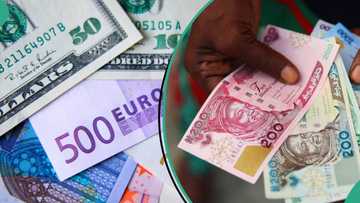Nigeria Missing From List of Top 10 African Countries With Lowest Debt to IMF
- A recent report from the International Monetary Fund (IMF) has disclosed that the least indebted African countries to the fund
- The report disclosed that those countries have maintained low debt profiles as they seek to invest more in economic development
- The latest report by the IMF excludes Nigeria, whose debt to the fund surpassed $2 billion
Legit.ng’s Pascal Oparada has reported on tech, energy, stocks, investment, and the economy for over a decade.
Despite loans from the International Monetary Fund (IMF) providing financial assistance and stabilising countries' economies, they also come with significant responsibilities and challenges.
A country’s debt burden rises about IMF assistance, which explains why African countries want to keep their debt profiles low.

Source: Getty Images
Benefits of low debt profile
Keeping a low IMF credit rating provides several benefits to African countries. It improves economic stability, sovereignty, and a good credit rating by lowering financial constraints and boosting policy flexibility.

Read also
Nigeria missing as South Sudan, Burundi top list of poorest African countries by GDP per capita
According to reports, countries with low IMF debt levels have more economic autonomy as they can forge and execute policies without external pressures, interferences, or conditionalities.
With less debt servicing, the government can have more resources to execute budgets and carry out essential services and initiatives rather than repay loans with interest.
Countries with lower financial obligations to the IMF can also invest in social investment programmes and safety nets, such as poverty alleviation initiatives, contributing to a resilient and inclusive society.
Nigeria’s debt to the IMF exceeds $2 billion
However, many African countries, including Nigeria, are heavily indebted to the IMF, the World Bank, China, and other bilateral loans.
Recently, Nigeria’s debt hit N121 trillion, with many fearing that the country’s debt-to-GDP ratio has exceeded the recommended levels.
The development led to the Debt Management Office (DMO) saying that Nigeria’s debt-to-GDP ratio is within the accepted ceiling.
DMO’s data reveals that Nigeria’s debt to the IMF has surpassed $2 billion as of March 31, 2024.
Top African countries with the lowest debt to the IMF.
Lesotho: $11.660m
According to the International Monetary Fund (IMF), Lesotho's fiscal balance had a large surplus in the 2023/24 fiscal year. The IMF also says that the outlook for external government revenues has improved and that the authorities should rebuild Lesotho's external buffers as a priority
Comoros: $20.329,825m
As of March 31, 2024, the Union of Comoros owed the International Monetary Fund (IMF) 18.25 million Special Drawing Rights (SDR) in outstanding purchases and loans.
This includes a quota of 17.8 million SDR and 15.24 million SDR in outstanding purchases.
The IMF has also worked with the Comoros on an Extended Credit Facility Arrangement. In June 2024, the IMF Executive Board completed a second review of the arrangement and noted that Comoros' economic reform programme showed signs of success.
Sao Tome & Principe: $24.145.150m
As of March 31, 2024, São Tomé and Príncipe had 24.4 million Special Drawing Rights (SDR) in outstanding purchases and loans with the International Monetary Fund (IMF). This also included a quota of 14.8 million SDR and 0.04 million SDR in special drawing rights.

Read also
SEC to monitor weekly cryptocurrency transactions after suspending Binance services, others
Djibouti: $31.8m
As of June 2023, Djibouti's debt arrears were around 6% of its GDP. The IMF assessed Djibouti's debt as unsustainable in 2021 and debt distress in 2022. In 2024, the IMF said that restoring debt sustainability would require a combination of reforms, new financing, and debt relief.
Guinea-Bissau: $43.76m
As of June 25, 2024, Guinea-Bissau was expected to have access to approximately $7.2 million from the International Monetary Fund (IMF) after the IMF Executive Board approved a staff-level agreement.
After demonstrating a commitment to policy reforms, the IMF approved the country, including improving governance, expenditure controls, and domestic revenue mobilization.
The IMF also expects Guinea-Bissau's economy to grow by around 5% in 2024, with inflation dropping to 4.2% from 2023's 7.2%.
Eswatini: $49m
As of March 31, 2024, the Kingdom of Eswatini's outstanding purchases and loans to the International Monetary Fund (IMF) were 58.88 million Special Drawing Rights (SDR). Eswatini has been a member of the IMF since September 22, 1969.
Cabo Verde:$64.984m
Outstanding Purchases and Loans (SDR): 55.22 million (March 31, 2024); Special Drawing Rights (SDR): 0.15 million; Quota (SDR): 23.7 million
Equatorial Guinea:$74m
As of June 30, 2024, Equatorial Guinea's debt to the International Monetary Fund (IMF) was 74.1 million Special Drawing Rights (SDR) in outstanding purchases and loans, plus a quota of 157.5 million SDR and 24.1 million SDR in special drawing rights.
Somalia: $79.5m
As of July 11, 2024, the International Monetary Fund (IMF) expects Somalia's external public debt to be reduced from $5.3 billion at the end of 2018 to $0.6 billion by 2023.
This is due to a $4.5 billion debt relief deal that Somalia secured with international creditors in December 2023.
The deal is part of the Heavily Indebted Poor Countries (HIPC) Initiative, which the IMF and World Bank oversee. The IMF's contribution to the debt relief is $343.2 million.
Burundi: $101.6m
In January 2024, the International Monetary Fund (IMF) visited Bujumbura to review Burundi's Extended Credit Facility Arrangement.
The IMF team's preliminary findings included that Burundi faces challenges with external sustainability due to a large current account deficit and low foreign exchange reserves.
A joint World Bank-IMF Debt Sustainability Analysis (DSA) from July 2022 also assessed Burundi as being at high risk of
FG confirms successful debt servicing
Legit.ng also reported that data from the budget office showed that the Nigerian government spent 64.5% of its 2023 revenue on debt servicing.
Actual debt service cost was about N7.66 trillion in 2023, an increase of 16.9% from the projected N6.56 trillion.
Actual debt service cost rose marginally in 2022 to N3.76 trillion from the budgeted N3.69 trillion.
Proofreading by James Ojo Adakole, journalist and copy editor at Legit.ng.
PAY ATTENTION: Unlock the best of Legit.ng on Pinterest! Subscribe now and get your daily inspiration!
Source: Legit.ng





